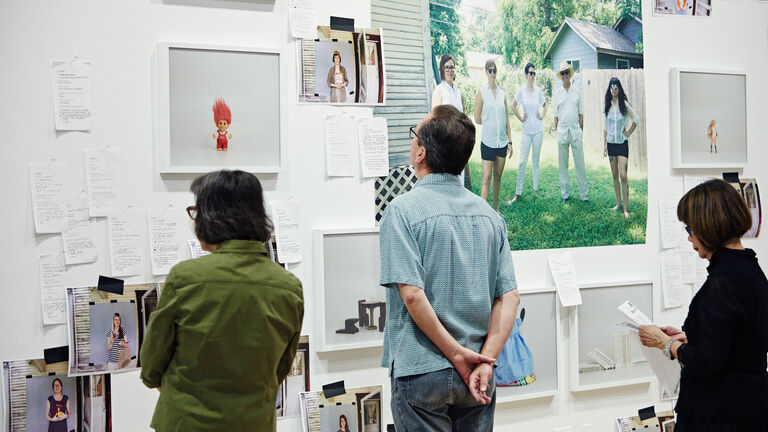
Graduate Curriculum & Courses
Graduate Curriculum & Courses
The Master of Fine Arts (MFA) program is designed to offer maximum flexibility in addressing the needs of each individual student. Following admission through a department, students design their two-year plan of study based on optimizing the offerings and opportunities available throughout SAIC.
Course titles and topics—over 30 offerings each semester—range from Intro to Photography to Lighting Fundamentals, Surrealism and Photography, Digital Light Projections, Fashion Photography, Advanced Post-Production, and more, allowing students to delve deeply into an area of interest, find synergies with departments and mediums across the school, or explore and master a wide range of techniques and equipment.
| Area | Credit Hours |
Studio
| 24
|
Seminar
| 12 |
Art History
| 12 |
Electives
Students who wish to use an alternative venue or presentation outside of these options must receive permission from the dean of graduate studies | 12 |
| Total Credit Hours | 60 |
* Students who wish to use an alternative venue or presentation outside of these options must receive permission from the Dean of Graduate Studies. The AIADO Department encourages students in their MFA design programs to participate in the AIADO and Fashion Graduate Exhibition.
Degree Requirements & Specifications
- Completion schedule: You have a maximum of four years to complete your MFA in Studio degree. This includes time off for leaves of absence. Students will have access to studios for four semesters only.
- Transfer credits: You must complete a minimum of 45 credit hours in residence at SAIC. You can request up to 15 transfer credits at the time of application for admission, which are subject to approval at that time. No transfer credits are permitted after a student is admitted.
- Art History requirement: MFA students are required to take ARTHII 5002 Graduate Survey of Modern and Contemporary Art OR ARTHI 5120 Survey of Modern and Contemporary Architecture and Design. Art History courses must be at the 4000-level and above.
- Undergraduate studio courses: Graduate students are permitted no more than one undergraduate studio course (3000-level and above) per semester without permission of the dean of Graduate Studies. Courses at the 1000 and 2000-level are allowed only with permission.
- Full-Time Status Minimum Requirement: 12 credit hours
Graduate Projects 6009
Graduate Projects 6009 advising, an ongoing individual dialogue with a wide range of faculty advisors, is at the heart of the MFA program at SAIC, encouraging interdisciplinary study across the curriculum. Standard enrollment consists of two Graduate Projects 6009 advisors, one graduate-level seminar, and an art history course each semester. The remainder of credits required for the full-time 15-credit hour load may include academic or studio electives. All MFA students must register for a minimum of one and no more than two Graduate Projects 6009 sections each semester. Students may request permission from the Graduate Program Advisor to take a third Graduate Projects 6009 section after priority registration.
In their final year, students must take one Exhibition 6009 section. The advising and grade for this course will be tied to the final exhibition. When taking undergraduate studio coursework, the student is responsible for understanding the faculty member’s expectations about completion of assignments, attendance, and any other criteria for earning credit. MFA students interested in completing a written thesis must take a research course and Research 6009 section and obtain approval from the Associate Dean of Graduate Studies.
Graduate Critiques
As one of the principle means of assessment each semester, you will be required to participate in Critique Week, a week-long schedule of critiques during which classes are suspended.
Fall semester critiques are organized by department with panels representing the discipline. This provides you with an opportunity to understand the department’s expectations, have your work reviewed from a disciplinary point of view, and to reiterate the expectations for graduate study.
Spring semester critiques are interdisciplinary, with panel members and students from across SAIC disciplines. Interdisciplinary critiques allow for a broad range of responses to your work, and are intended to assess the success of your work for a more general, albeit highly informed audience. Critique panels include faculty, visiting artists, and fellow graduate students.
Graduate Exhibition or Equivalent
At the conclusion of your studies, you will present work in the SAIC Graduate Thesis Exhibition, other end-of-year events at SAIC, or the Gene Siskel Film Center—or arrange with the graduate dean or division chair for an alternative thesis of equal professional quality. Each year more than 200 graduate students exhibit work, screen videos and films, and present time-based works, writings, and performance to a collective audience of 30,000 people.
Students wishing to install work around prevalent themes, strategies or stylistic affinities can participate in a juried and curated section of the SAIC Graduate Thesis Exhibition. A faculty and staff committee conducts extensive studio visits and, as a collaborative project with student participants, organizes and installs the show in designated space at the exhibition.
Undergraduate Courses
MFA students are advised to understand the expectations of their faculty when enrolled in undergraduate studio classes. Although graduate students are an asset to the group dynamic, faculty requirements for graduate students in undergraduate classes are variable. The student is responsible for understanding the faculty member's expectations about completion of assignments, attendance, and any other criteria for earning credit. To assure that graduate students are working at degree level, they are permitted no more than one undergraduate studio course (3000 level and above) per semester without permission of the dean of graduate studies. Courses at the 1000 and 2000 level are allowed only with permission.
Course Listing
Take the Next Step
Visit the graduate admissions website or contact the graduate admissions office at 800.232.7242 or gradmiss@saic.edu.